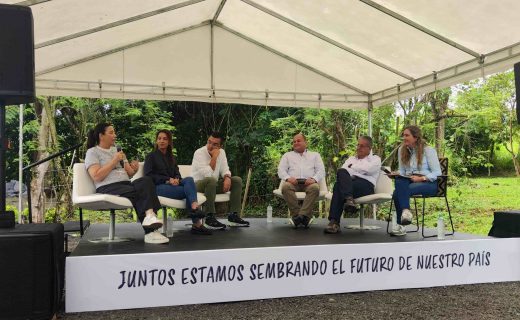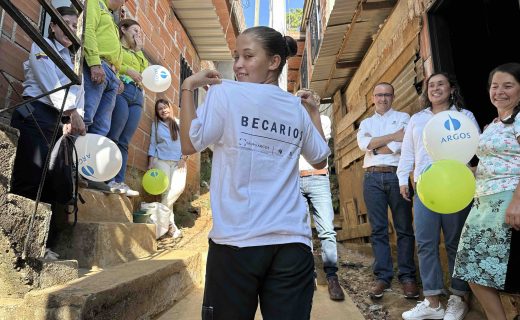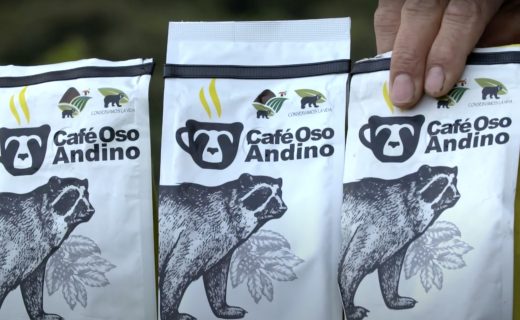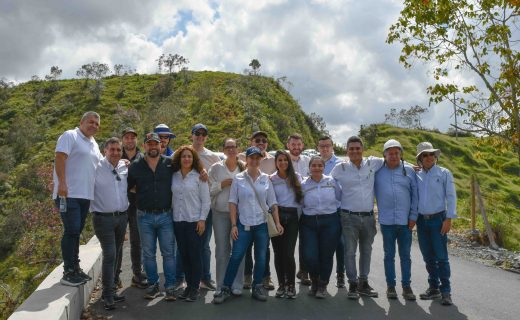

Grupo Argos Foundation • News • Sustainability
Grupo Argos Foundation, Terraformation, the Government of Antioquia, and the Province of Cartama sign an agreement for over COP 5 billion to promote sustainable livestock farming
6 November 2024- The signing of the agreement took place at the offices of the Government of Antioquia and included the participation of Manuel Naranjo Giraldo, Secretary of Productivity and Competitiveness, and María Camila Villegas, Executive Director of Grupo Argos Foundation.
- This agreement promotes the implementation of practices that contribute to environmental conservation, sustainability, and resilience of rural communities in the face of climate change, aligning with the efforts that Grupo Empresarial Argos is advancing in southwestern Antioquia through conservation, education, and productivity programs.
- The pilot project will be carried out across an area of more than 500 hectares of livestock properties where silvopastoral systems will be implemented. Practices will be integrated to promote livestock welfare, local biodiversity, pasture improvement, and forage planning.
- Grupo Argos Foundation will provide 72% of the resources.
Grupo Argos Foundation, Terraformation (a global climate technology company), the Government of Antioquia, and the Province of Cartama signed a memorandum of understanding aimed at developing sustainable livestock systems in this area of southwestern Antioquia.
This agreement promotes the implementation of practices that contribute to environmental conservation and the resilience of rural communities against climate change by establishing silvopastoral systems with the planting of native timber and forage tree species to transform over 500 hectares of livestock properties. These practices integrate measures to enhance livestock welfare and local biodiversity, improve pastures, plan forage, and manage farm enterprises.
This initiative is bolstered by the partnership between Grupo Argos Foundation and Terraformation, which is accelerating ecological restoration processes in strategic ecosystems in southwestern Antioquia through the Sembrando Futuro program. This program aims to plant 2.3 million trees by 2025 and is integrated into the global voluntary carbon credit market, offering landowners a revenue of USD 5.5 for every USD 10 generated.

“We are working to harmonize the relationship between humans and nature by strengthening the productivity of agricultural sectors, while simultaneously ensuring the conservation of strategic ecosystems and improving community incomes, creating new opportunities derived from environmental stewardship.”
María Camila Villegas
Executive Director, Grupo Argos Foundation
The new agreement with livestock farmers aims to strengthen this sector while advancing toward a sustainable production model that benefits both local producers and the environment. This initiative also includes a significant component of training and technical support in sustainable livestock practices to improve productivity. The trees planted within the silvopastoral system will allow farmers to benefit from the voluntary carbon market, which includes the Sembrando Futuro program, enabling them to earn income from carbon credit sales. Similar to the first beneficiaries of the program, in this case, farmers will receive USD 5.5 for every USD 10 generated.

“We aim to enable livestock production to be framed within sustainable processes, which benefits the 11 municipalities of Cartama in a sector that is very important for the economy of the department of Antioquia and particularly for the southwestern subregion,” stated Manuel Naranjo, Secretary of Economic Development of the Government of Antioquia. He also highlighted that this project is a milestone for public-private collaboration and for projecting it into the territorial associative schemes being developed by the Government.”
Manuel Naranjo
Secretary of Productivity and Competitiveness of Antioquia
This joint effort aligns with the guidelines of Colombia’s Sustainable Livestock Policy and the country’s carbon neutrality goal, contributing from Antioquia to achieving the national objectives for greenhouse gas mitigation.
Mas noticias
-
 Grupo Argos Foundation
Grupo Argos Foundation -
 Creamos Valor Social
Creamos Valor SocialThe project to make Nueva Colonia’s sewer system in Turbo a reality has been approved: more than 12,000 people will see an improvement in their quality of life
5 March 2025 Read more -
 News
NewsGrupo Argos and its companies, Cementos Argos and Celsia, reaffirm their leadership among the most sustainable companies in Colombia, according to Merco
26 February 2025 Read more -
 Grupo Argos Foundation
Grupo Argos FoundationEight farming families in Valle del Cauca received the international quality certification recognizing them as protectors of the Andean Bear in Colombia
21 February 2025 Read more -
 Creamos Valor Social
Creamos Valor SocialMore than COP 350 billion invested by Grupo Empresarial Argos and its allies to transform lives in vulnerable municipalities
20 February 2025 Read more
